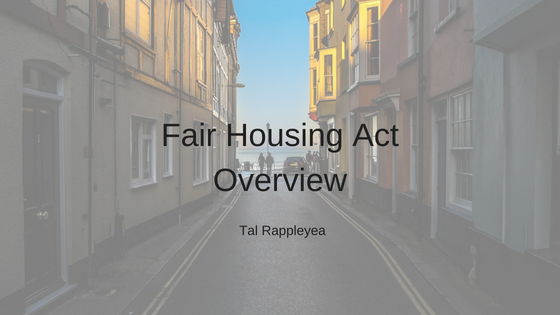Until the Fair Housing Act was passed in 1968, discriminatory housing practices ran rampant and prevented many earnest buyers seeking their first homes from realizing a dream. Though the signing of the Fair Housing Act came on the heels of the assassination of Dr. Martin Luther King, Jr., the Fair Housing Act has become a saving grace for those that were prevented from purchasing homes for many, many years.
The Fair Housing Act extended the basic discrimination protections contained within the 1964 Civil Rights Act into the housing market. It very clearly prohibits discrimination based on race, color, national origin, religion, and sex. There were additional amendments in 1988 to included familial status and disability as protected classes. Also protected by the Act are specific types of real estate primarily aspects of the sale, rental, and financing of dwellings.
The Fair Housing Act came to be as a result of residential segregation that became disadvantages especially for minorities, particularly black homebuyers and renters. Though this residential segregation started within individual communities, it quickly became government policy. The Federal Housing Administration began using a practice known as “redlining” where refusal to issue loans for properties located in black communities was allowed. This caused an obvious division within the country and with the added Civil Rights Act coming into play combined with the assassination of MLK, President Lyndon Johnson felt that passing the Fair Housing Act was a fitting memorial to MLK’s life’s work.
The Fair Housing Act is enforced by the Office of Fair Housing and Equal Opportunity within HUD. Any individual who feels that they have been discriminated against may file a complaint with HUD. Once that complaint is filed, HUD would contact the alleged violator to request a response. HUD then works towards an agreement between the two parties and should an acceptable agreement be reached, HUD would take no action. If the agreement is broken, HUD would recommend that the Department of Justice become involved.
If it has been resolved that discrimination occurred, the case would be heard in a hearing or Federal District Court. If there is a ruling that discrimination occurred, the violator could be ordered to compensate the plaintiff for any damages, make housing available, pay a penalty and attorney’s fees.
The Fair Housing Act is simply a way to ensure that all who want to purchase homes have the opportunity to do so. Whether they are eligible for lending and mortgages is a matter of credit and income requirements but the Fair Housing Act opens the door for all to be able to pursue purchasing a home if that’s part of their life’s dream.
